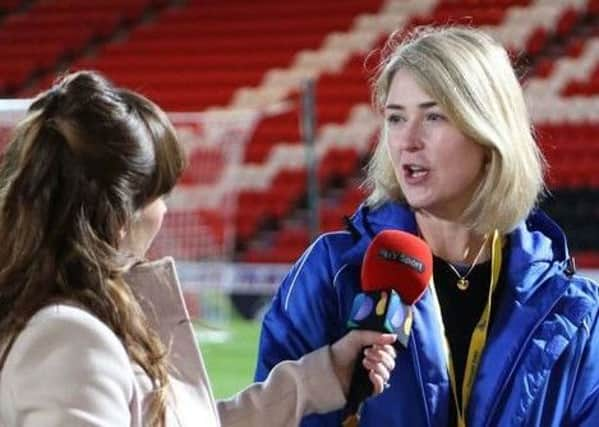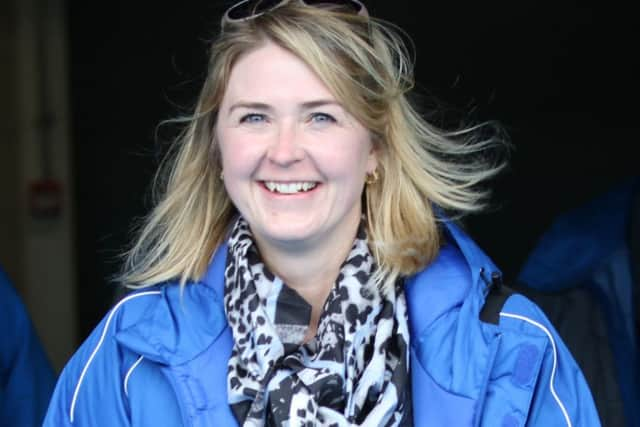The Big Interview: Doncaster Rovers Belles chairlady Faye Lygo on the FA's latest Super League restructure and what next for the Belles?


It is fair to say that the last few years have been up and down for Doncaster Rovers Belles.
In 2013 they were infamously demoted from FAWSL1 and replaced by Manchester City.
Advertisement
Hide AdAdvertisement
Hide Ad

Two years later they secured promotion back to the top flight but were subsequently relegated with just three points to their name.
Belles, under the stewardship of Neil Redfearn, lead the way in FAWSL2.
But, regardless of where they finish, they will remain in the second tier next season having decided that the FA’s latest re-design of the women’s game in this country - a new fully professional top division - is out of their reach financially.
So where exactly does that leave the Belles and what does the future hold? I put those questions to the club’s chair and marketing director Faye Lygo.
Advertisement
Hide AdAdvertisement
Hide Ad

PG: How do you assess the 2018/19 restructure and the position in which it leaves Doncaster Rovers Belles?
FL: I feel that the FA restructure is too hard hitting, as it again takes promotion off the field and onto a paper application.
If the aim is to improve the quality of league standards for the Lionesses, then the natural process of promotion and relegation based on footballing merit will achieve this and the teams with the stronger squads will rise up the leagues.
If the aim is to bring in more women’s teams (and the application process is currently open to teams outside the Women’s Super League), then this gives a shortcut for teams with more financial backing.
Advertisement
Hide AdAdvertisement
Hide AdThe Belles are left at the top of WSL2, with the potential to be the top finishing team on footballing grounds, but not having a Tier 1 space, because we couldn’t commit to the new financial requirements in 2017.
PG: Do you think promotion and relegation from the new top flight and second division should be determined solely by on the pitch performance?
FL: I think it is important for the standards and integrity of the women’s game that promotion and relegation is determined by success on the pitch and not the ability to buy a position and jump frog into the top leagues.
I appreciate that the FA want to improve the standard of the women’s game, but I don’t think tinkering with the composition allows for long term club planning and makes the step up a big ask for many clubs who have supported the women’s game and the FA for many years.
Advertisement
Hide AdAdvertisement
Hide AdA club with massive resources could secure a Tier 1 place, but that does not mean they can put a competitive squad together quickly enough to ensure their place raises standards.
This might take them a season or two to bed in, by which time the next Women’s World Cup will have taken place.
PG: Are Belles currently a part time or full time operation, and how do you see this status evolving in the short and long term?
FL: The Belles are currently operating on a part time basis, but with the know how of a full time operation.
Advertisement
Hide AdAdvertisement
Hide AdFor the moment our finances and WSL2 league position are consistent with being part time, particularly until such time as promotion looks possible and we can meet the FA’s financial requirements for a top division club.
PG: Do you believe that the Belles have been treated fairly or unfairly by the FA since the Super League was formed in 2011?
FL: The Belles have been treated consistently with other WSL2 clubs.
The FA are focused on the performance of the Lionesses and raising the standards of the women’s game, together with associated attendance and participation.
Advertisement
Hide AdAdvertisement
Hide AdThere is a clear bias towards WSL1 clubs, who get the majority of the coverage and promotion, and it is clear that clubs with money are seen to better help the FA achieve their goals.
PG: The club opted not to apply for a Tier 1 licence for 2018/19 but earlier last year did apply to replace Notts County Ladies in this season’s FAWSL1. What changed?
FL: The only things that have changed are the FA’s requirements for a top division club.
Applying for the Notts County available FAWSL1 space in 2017 was consistent with the set up and aspirations of the Belles and we felt for many reasons, both on and off the pitch, that the place was fairly ours.
Advertisement
Hide AdAdvertisement
Hide AdHowever, the backdrop to this available space were the FA’s plans to change the basis of the top division, which includes having a full time squad of players, with the necessary additional requirements on coaching and facilities.
This significant financial increase puts Tier 1 out of our financial reach at this time.
PG: Is the club’s aim to attain Tier 1 status? How, and by when, do you hope to achieve this?
FL: The club is ambitious and fiercely supportive of the women’s game.
Advertisement
Hide AdAdvertisement
Hide AdWe want to be in Tier 1 and the earliest opportunity will be the 2019/20 season.
The Belles celebrate their 50th anniversary in 2019, but the game has changed and the club needs local business support.
The women’s game is moving fast and gaining a higher and higher profile, but the Belles will be left behind without strong business input.
PG: The new licence criteria stipulates that top flight clubs must have an academy. Do the Belles satisfy this requirement?
Advertisement
Hide AdAdvertisement
Hide AdFL: The exact definition of this is still being ironed out by the FA, so it is difficult to comment, but we do have our own successful Regional Talent Club and Sister Club programme, with great relationships and links to the County FA and grassroots clubs.
PG: In 2015 it was stated that the club had a ‘ten year plan’ to restore their former glories and ultimately compete in Europe. Is this plan still ‘active’?
FL: The women’s game is moving fast and gaining increasingly higher public profile.
The club is innovative and progressive and we want to compete at the highest levels, but we have a moving target and whilst our plan is still active, we must respond to the ever changing environment.
Advertisement
Hide AdAdvertisement
Hide AdPG: What happened to ‘Project Phoenix’ (plans for a state-of-the-art training complex in Misson) and where is the club’s current training base?
FL: The Belles are considering various options and routes to achieving their financial goals and footballing objectives and are currently training at the Keepmoat.
The [Project Phoenix] plans are not completely shelved, but at this time we are exploring some options and are not pushing anything through.
We do have some planning permission and some steps have been taken.
Advertisement
Hide AdAdvertisement
Hide AdPG: Would Belles benefit from officially joining Club Doncaster and is that something the club is open to?
FL: The Belles have a great relationship with Club Doncaster and are open to developing this relationship to the mutual enjoyment of both parties.
PG: Is there anything you would like to add about the club’s current status and their short and long terms goals?
FL: The Belles are looking forward to celebrating their 50th anniversary in 2019 and are very much pushing the boundaries and possibilities available to them.
Advertisement
Hide AdAdvertisement
Hide AdWe have pioneered a mentoring programme for female coaches and managers; something the FA are following us on and benefiting from, having acquired our previous head coach, Emma Coates.
In addition, we are the first club to have a head coach from the men’s game, in our appointment of Neil Redfearn.